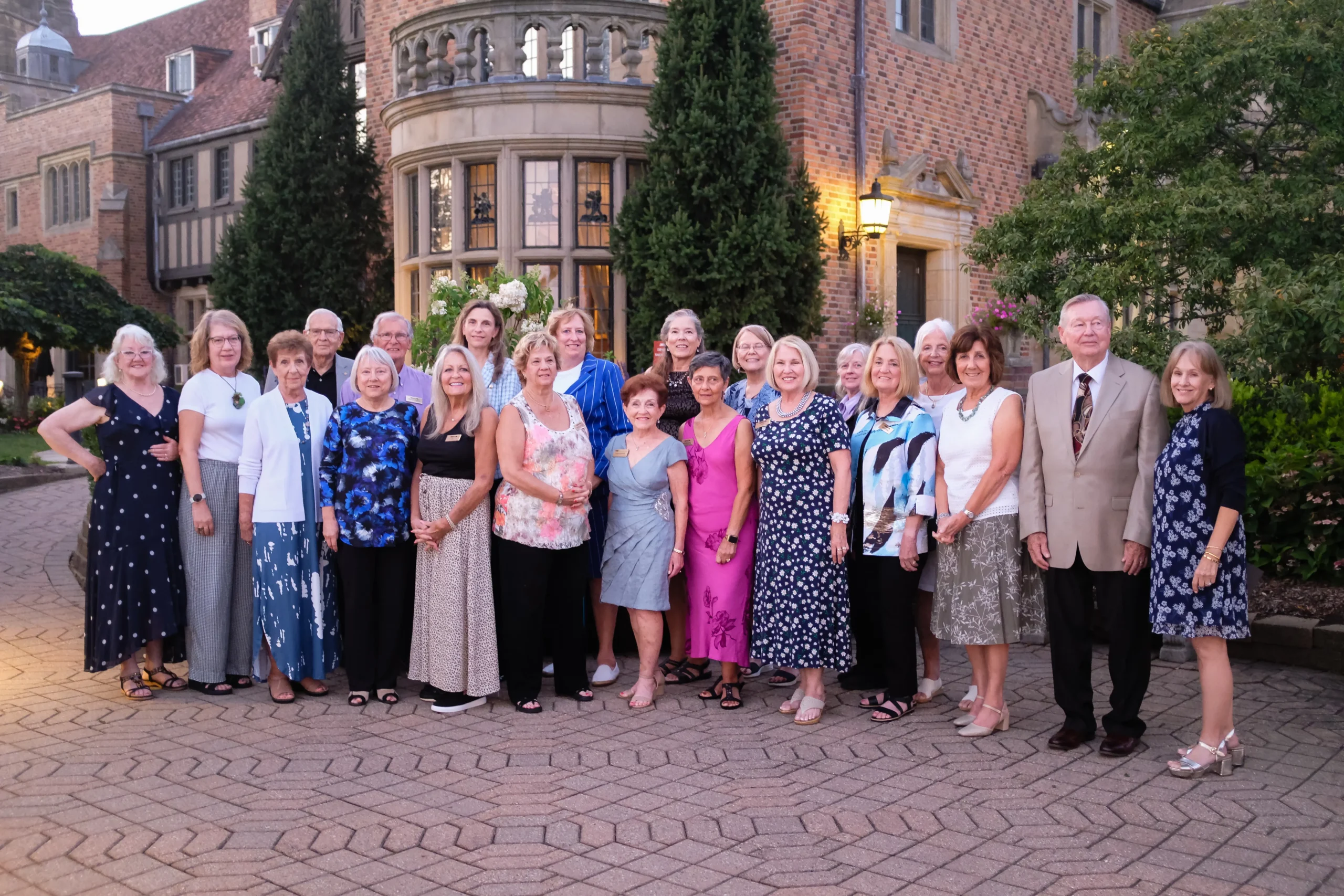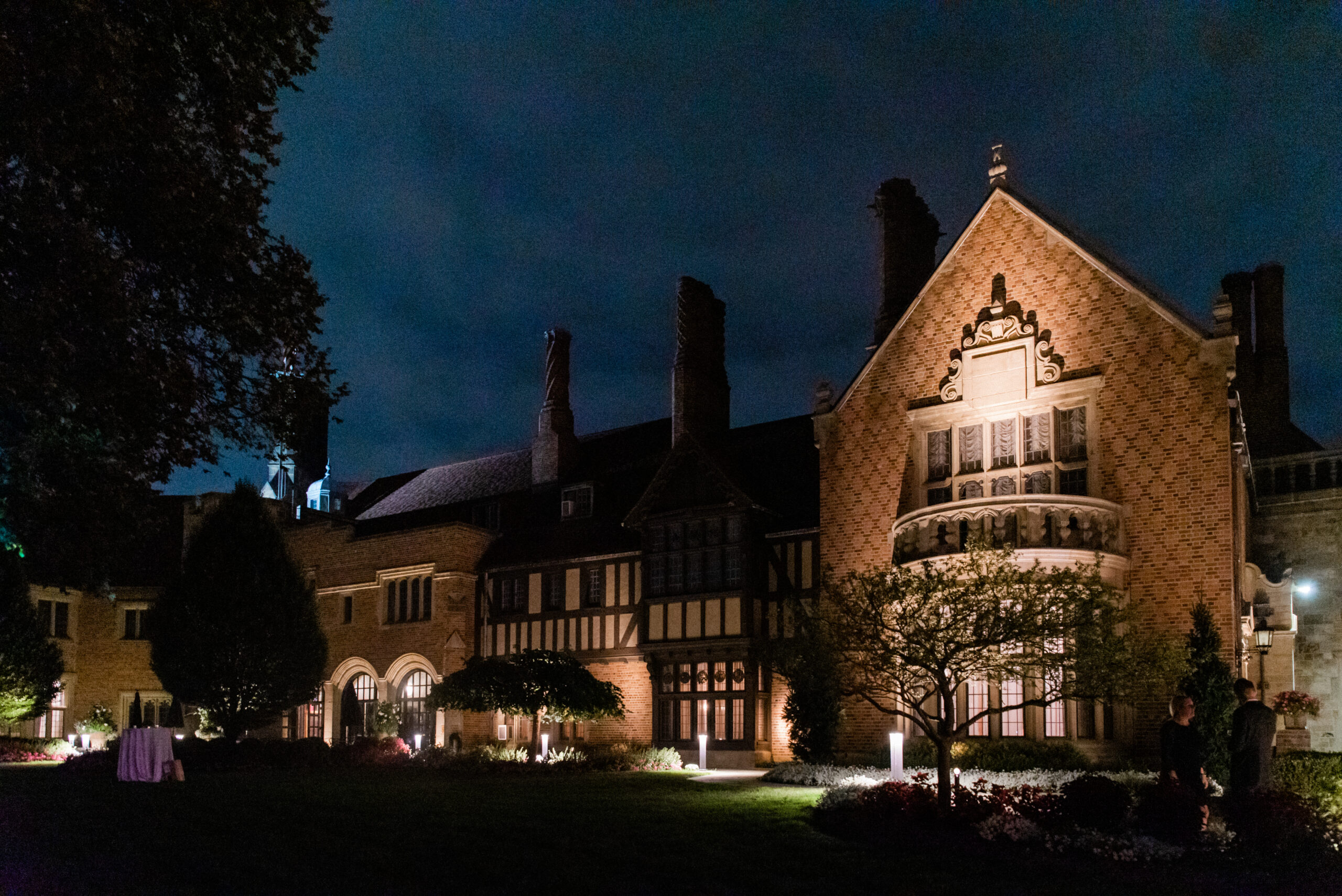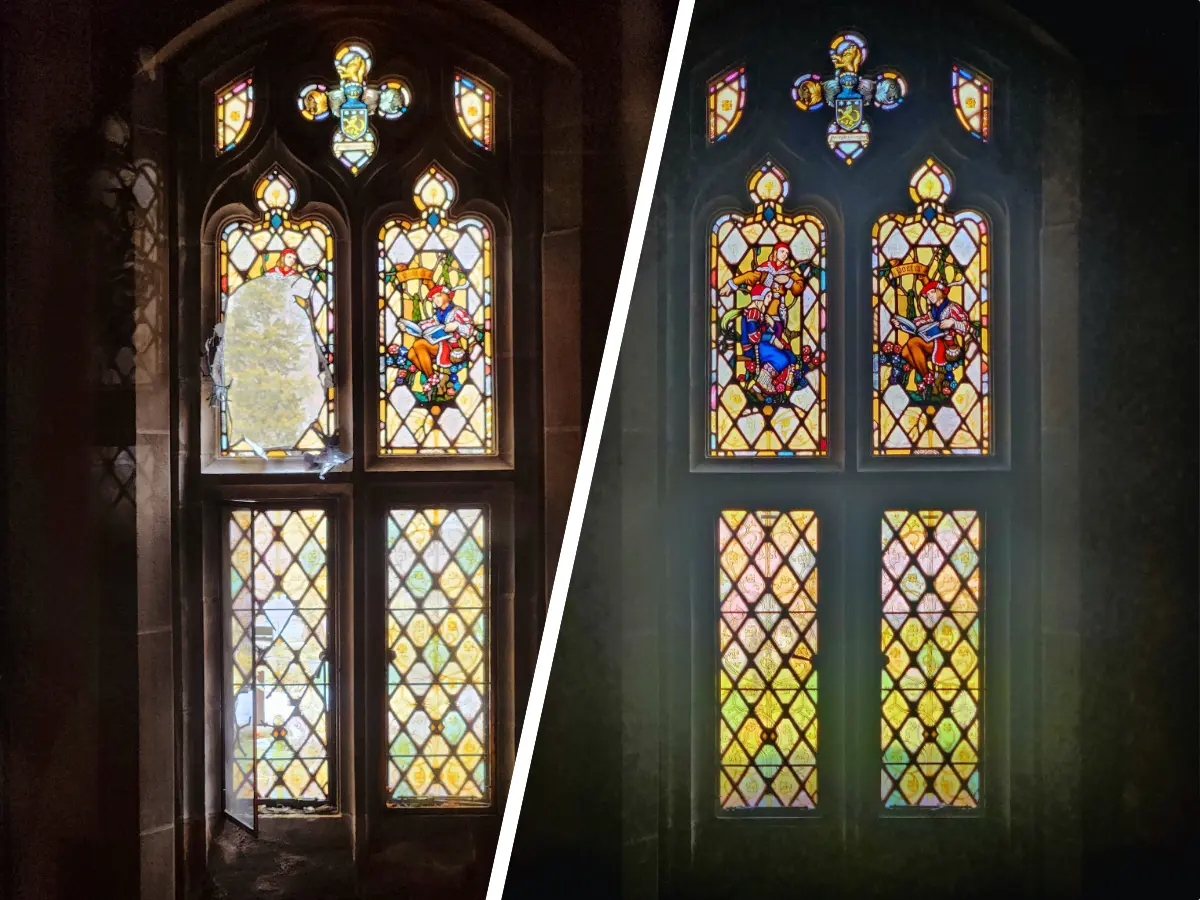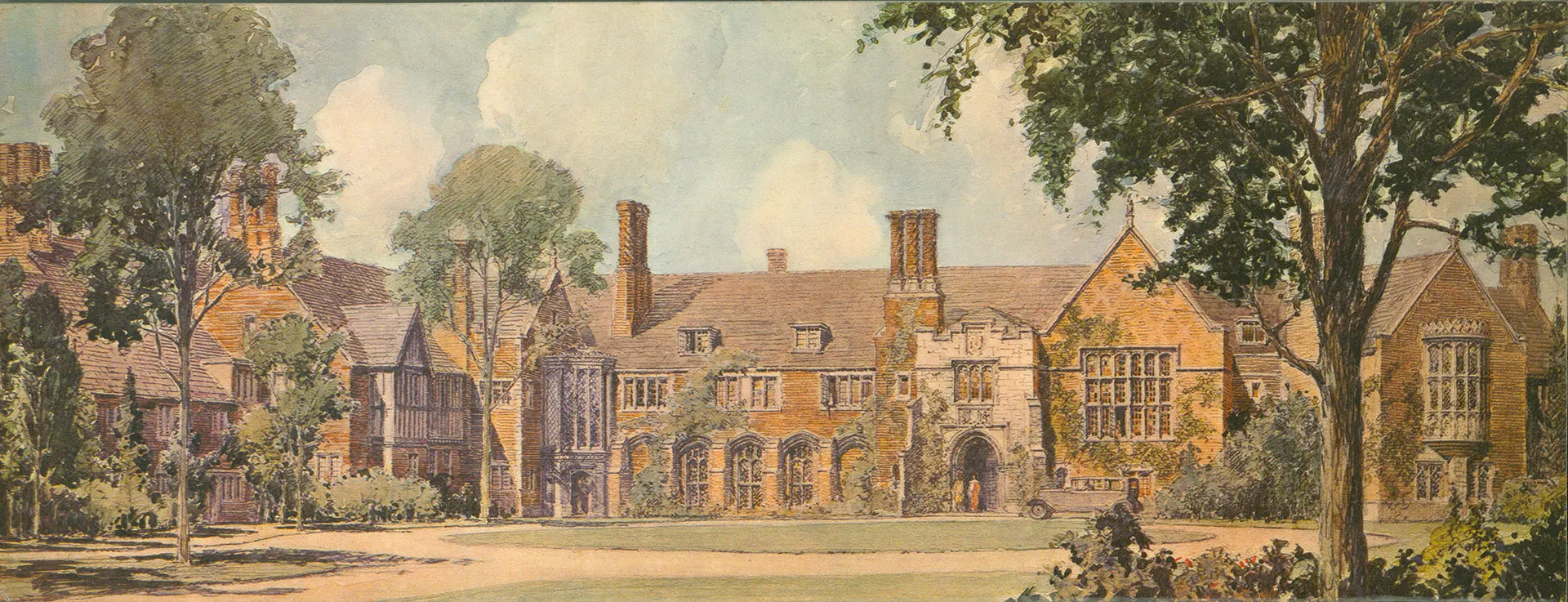
Meadow Brook Hall and its family built a historic legacy.
Meadow Brook Hall is the historic home built by Matilda Dodge Wilson, widow of auto pioneer John Dodge, and her second husband, Alfred Wilson. Constructed between 1926 and 1929, it was the center of a country estate that included 1,500 acres, numerous farm buildings, recreational facilities, several residences and formal gardens.
Meadow Brook Hall History
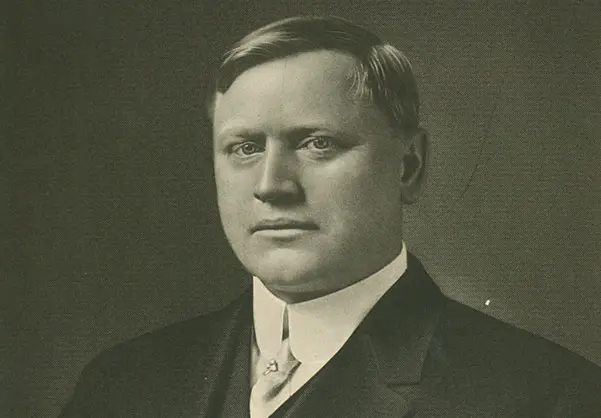
1864
John Dodge is born.
John (1864-1920) and his brother Horace (1868-1920) were born into an industrious but humble family in Niles, Michigan. The brothers specialized in machine shop precision part-making and worked on typographs and bicycles before automobiles. Throughout their lives, the Dodge brothers brought an incredible talent, skill and dedication to their craft.
Bold and brash, coarse and competitive, dynamic and driven… this is the larger-than-life reputation of John and Horace Dodge – founders of the Dodge Brothers Motor Car Company.
The Dodge Brothers Motor Car Company officially launched in 1914 and focused on innovation and quality above all else. Their four-cylinder Dodge Model 30-35 Touring Car included unique features that soon became the standard, such as the speedometer, first all-steel body and an electric ignition system. They even built a special proving grounds onsite at their factory, which is believed to be the first-known instance of this practice. Each car that came off the line went up and down the wooden hill and through a sand pit before final inspection.
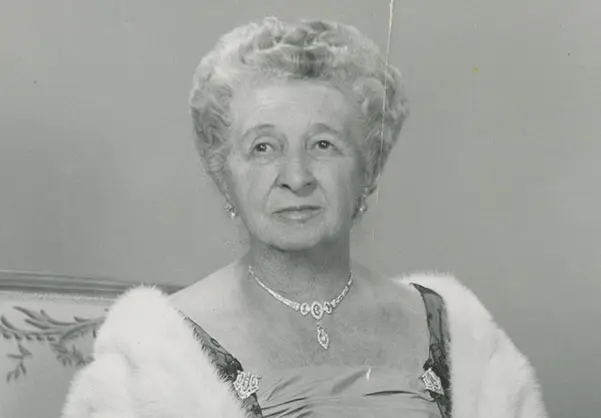
1883
Matilda (Rausch) Dodge Wilson is born.
The daughter of a saloon-keeper, Matilda (Rausch) Dodge Wilson (1883-1967) was a self-made, modern woman of the 20th century who lived an all-American success story.
She built a legacy as a businesswoman, preservationist, art collector, horsewoman, farmer and philanthropist. She was the first female lieutenant governor of Michigan.
Matilda had an enormous positive impact through her work in more than 40 community service, political and philanthropic organizations and by establishing Meadow Brook Hall, now a National Historic Landmark. Matilda’s most enduring achievement is the founding of Oakland University in 1957.
Yet her life was dappled with tragedy. When the world seemed at her feet, Matilda became a young widow with three small children when her husband automotive pioneer John Dodge died unexpectedly in 1920, after contracting the flu during the 1918 pandemic. Though left with an immense personal fortune, she was stricken with grief at his loss, and the soon-to-follow death of her young daughter Anna Margaret from measles in 1924. Later, she found a second love with the kind and warm-hearted Alfred Wilson (married in 1925), but lost her son Daniel as a young man (1938).
Despite her losses, or perhaps because of them, Matilda was devoted, untiring and brought a visionary approach to her life’s work. Deeply generous, resilient and driven, she shared her gifts of wealth, grace, perseverance, and even luck, to better the community and world around her.
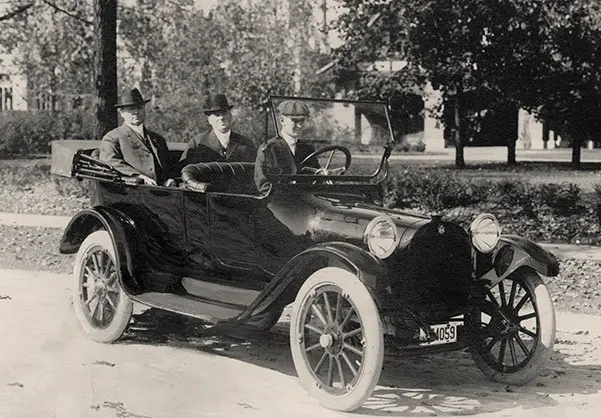
1902
Matilda Rausch and John Dodge meet.
Matilda began working as a secretary to John and Horace Dodge at their growing automotive parts company. Soon, her business acumen, keen organizational skills and sound judgment helped make the Dodge Motor Company a household name.
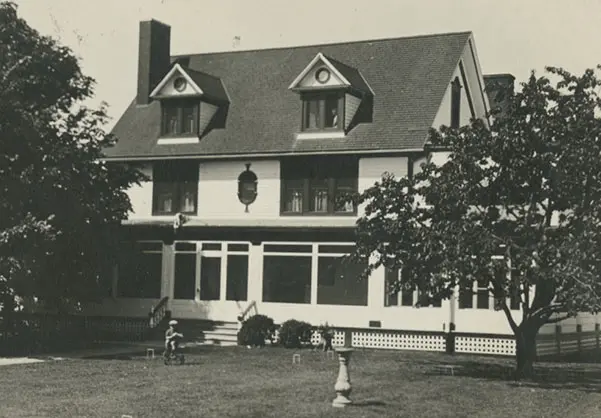
1907
Matilda Rausch and John Dodge are married.
Matilda married widower John Dodge in 1907. Their marriage made Matilda an American citizen (she is Canadian by birth) and stepmother to his three children from his first marriage. Matilda and John also had three children together: Frances, Daniel and Anna Margaret, who died from measles shortly before her fifth birthday.
During her 13-year marriage to John Dodge, Matilda devoted her time to raising their children and managing the household, which included a substantial home on Boston Boulevard and the Meadow Brook Farms property in Rochester. In 1919, the Dodges began construction on a palatial mansion in Grosse Pointe, not too far from Horace and Anna Dodge’s Rose Terrace.
It was also during this time that Matilda pursued her interests in history, arts and culture, and became active in public service and philanthropy, including what would become a lifelong involvement with the Salvation Army and the Presbyterian Church.
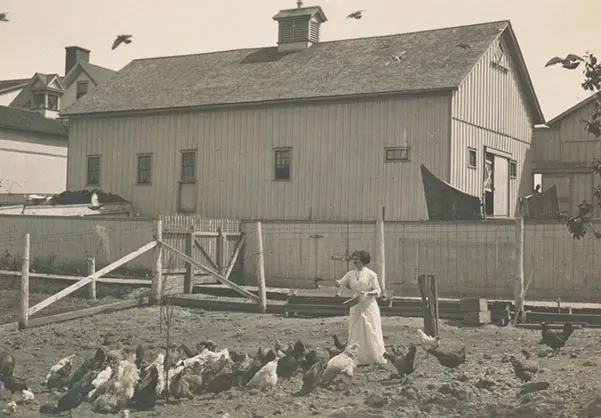
1908
Meadow Brook Farms property is purchased.
Meadow Brook Hall history officially begins in 1908 when John and Matilda Dodge bought a 320-acre farm in Rochester as a weekend country retreat. At the time, Oakland County was very much “the country,” with rolling Irish hills, rich natural resources and very little traffic.
What began as a working farm grew over time to include more than 2,000 acres and several residences, including the historic mansion itself. Under Matilda’s management, Meadow Brook Farms grew profitable and gained a reputation for quality produce and livestock. Famed Detroit boxer Joe Louis had an estate nearby and always got his eggs from Meadow Brook Farms.
John and Horace used the Meadow Brook Farms property as a proving ground to test the new Dodge automobile in secrecy. The pair did a lot of work there, treating it as a satellite office of the Dodge Motor Car Company. The Dodge brothers believed so much in the benefits of the outdoors that they even invited their employees from the city out to relax and rejuvenate.
Although John Dodge never lived at Meadow Brook Hall (it was built years after his death), he is intrinsically linked to it through his impact on Meadow Brook Farms and the incredible Dodge Brothers wealth that enabled it to be built.
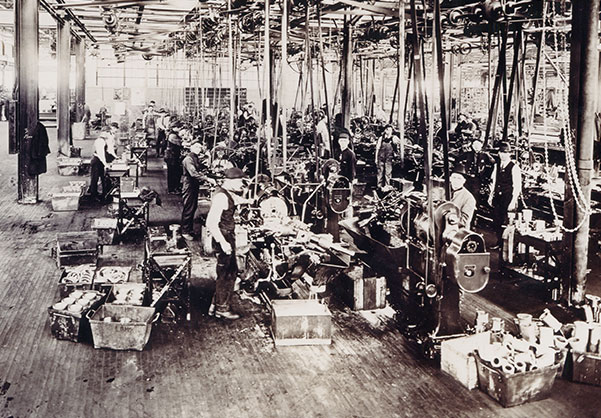
1920
John Dodge dies.
By 1920, the Dodge brothers had tripled the size of their plant to 3.3 million square feet, produced nearly 425,000 automobiles and employed 20,000 workers. They were the second-largest automobile manufacturer in America, with Ford in first place. This feat is particularly remarkable given that the Dodge brothers only ran their company for six short years (and four of these were during World War I.)
During the war years, the Dodge brother’s talents and reputation as being excellent and precise engineers made them one of the top U.S. military vehicle and weapon suppliers.
In January 1920, the men behind the biggest car brands in the world (Dodge Brothers, Ford, Olds, Chevrolet) gathered for the New York Auto Show. Lamentably, the show was set in the midst of the global 1918 Influenza Pandemic, which claimed two more victims. John and Horace Dodge. John died in New York after contracting the disease and Horace died before the end of the year.
One can see the impact John’s life had on others by their response to his death, which included a more than 300 person escort for John’s casket when it arrived at the Detroit train station. Dodge Brothers Motor Car Company employees, of which there were 18,000, waited in a line for hours down Woodward Avenue to view his body and pay their respects.
Matilda was left a young widow with a breathtaking personal fortune.
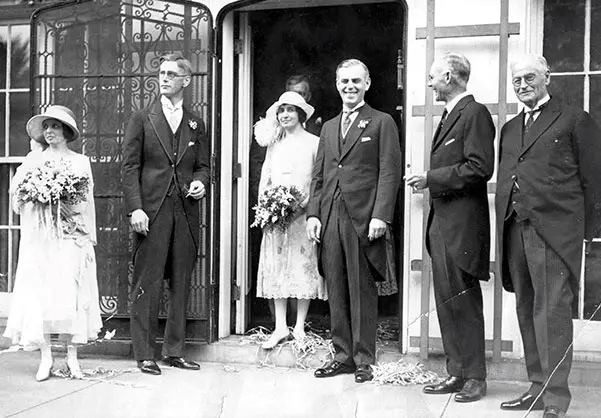
1925
Matilda Dodge and Alfred Wilson marry.
The loss of a husband and child within a few short years is a terrible thing. Over time, Matilda began to find solace in her church, First Presbyterian in Detroit, where she found strength in a burgeoning friendship with the loyal, gentle and charming lumber broker Alfred Wilson (1883-1962).
Alfred helped Matilda open up and trust again. He was a much-needed addition to the family dynamic and found his own place in building relationships with Frances and Danny. They were married in 1925.
Alfred brought his own brand of humor and character to Matilda’s life, which can be seen throughout The Hall in his personal Game Room for entertaining, his “secret staircase” and the light-hearted carved wood frieze of his life in his study.
Much like Matilda, Alfred was active and supportive of many social, civic and charitable causes. Most notable was his involvement in the Boy’s Club of America. He was also a trustee of Beloit College, a member of the Masonic order, and a leading participant in community affairs in Oakland County.
Together, they raised Frances and Daniel Dodge and later adopted two children, Richard and Barbara.
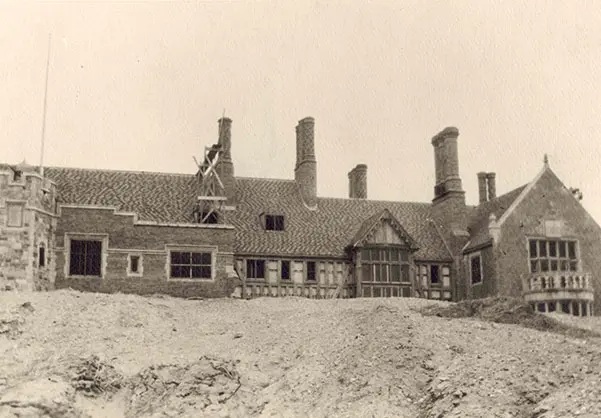
1926
Construction begins on the Great Estate.
Meadow Brook Hall is an architectural masterpiece inspired by the grand estates of England, yet it was almost entirely created by American materials and American craftsmanship. Matilda worked closely with architect William E. Kapp of Smith, Hinchman & Grylls and landscape architect Arthur E. Davidson on the extensive mansion, grounds and gardens. She was personally involved in every detail — from choosing switch plate covers to the design of the Grand Staircase.
The Great Estate is representative of the lavish living and entertaining lifestyles of the 1920s and was a passion project for Matilda. She wanted Meadow Brook designed to host parties for over 250, seated dinners for 40 and comfortable living space for a family of four.
Meadow Brook was constructed between 1926 and 1929 and cost about $4 million. To add up all of the materials, furnishings, artifacts and artwork today — it would be priceless.
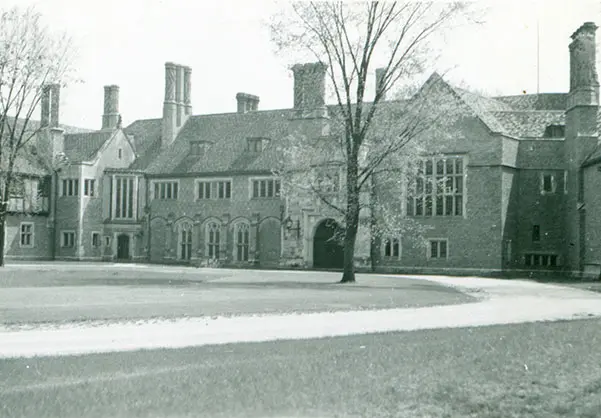
1929
Meadow Brook Hall opens with a house warming party.
On November 20, 1929, the Great Estate welcomed guests for the first time with a grand party. After three years of construction in almost total secrecy, the Dodge-Wilsons were ready to welcome friends, family and the community to their estate.
Despite stormy weather and only sending out 400 invitations, more than 850 people arrived through the gates to eat, drink, socialize and marvel at the magnificent mansion.

1930
Richard Wilson joins the family.
Richard Wilson (1929-2022) was adopted as a baby by the Wilson family and grew up alongside Frances, Danny and his beloved younger sister Barbara (adopted the following year) at Meadow Brook Hall.
As a teenager, Richard developed a love for animals and modern farming techniques, as well as a keen mind for business. He went on to graduate from Michigan State College (now Michigan State University) with a Bachelor of Science degree in Agriculture.
Richard worked with his sister Frances Dodge Van Lennep’s equestrian enterprises in Florida and Michigan, including managing Wolverine Raceway and Pompano Park. He was well-known in the sports industry and worked as a sportscaster in Detroit.
In 2005, Richard was elected to the Florida Harness Racing Hall of Fame.
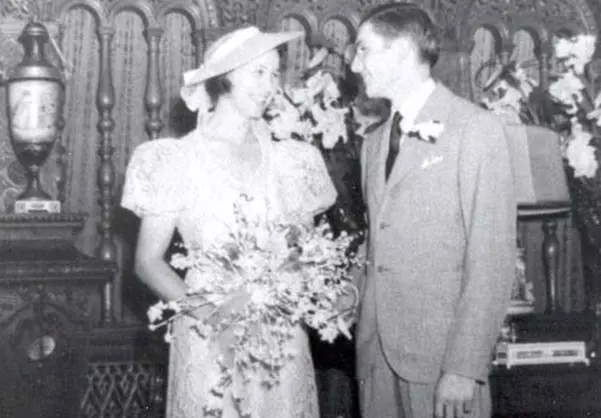
1938
Daniel Dodge marries and dies in tragic accident.
By all accounts, Daniel Dodge was an engaging and friendly young man, whose life was cut too short.
Like his father John Dodge, Dan enjoyed hunting and had a mechanical mind. Even as a teenager, Daniel was well on his way to being a great innovator. He developed an innovative diesel motor for automobiles and turned his childhood “cabin” on the estate into a workshop and experimental laboratory complete with a garage door that he used to work on automobiles and engines.
Daniel loved the great outdoors and spent much time on Manitoulin Island, where he met and fell in love with a young telephone operator Annie Laurine MacDonald. The two were wed at an intimate ceremony in the Living Room of Meadow Brook Hall—just a month after his older sister Frances was married at the estate.
Unfortunately, their young love and Dan’s promise as an inventor was not to last. As the two honeymooned on Manitoulin Island, Dan was injured by explosives. He fell overboard on the way to the hospital and tragically drowned in Lake Huron on Aug. 15, 1938. Dan’s death brought great grief to his family and young widow.
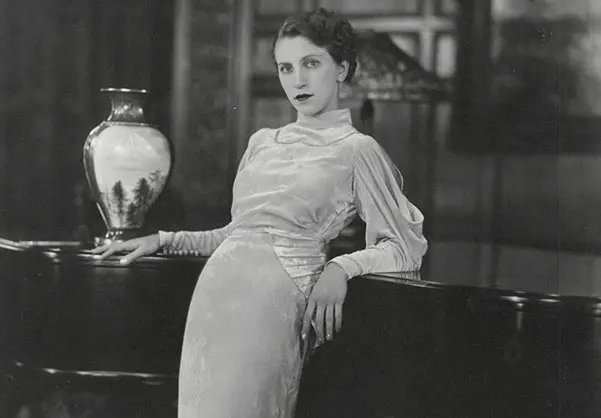
1939
Frances Dodge’s 25th birthday party.
Known as “Detroit’s #1 Glamor Girl” for her sparkling personality, penchant for adventures, and impeccable style, Frances Dodge (1914-1971) celebrated her 25th birthday with a party that went down in Meadow Brook Hall history.
While Frances and select guests enjoyed an elegant dinner at the estate’s Dining Room, an exuberant crowd secretly gathered in the ballroom to surprise her with a big party — complete with live music from the Tommy Dorsey Band, featuring a young singer named Frank Sinatra.
Frances loved to travel. With her inheritance from her father John Dodge, Frances treated her mother and stepfather to a six-month long journey across the southern hemisphere in 1934. They packed up 15 suitcases and seven trunks to visit 58 cities, spanning 33,048 miles.
Frances Dodge was also an internationally renowned horsewoman and keen business woman. She opened the world-renowned Dodge Stables while she was in her 20s, and built big success in horse breeding at Castleton Farms, Kentucky.
Frances set the record for trotting under saddle – a record that stood for 54 years until it was broken by a horse bred by one of her daughters. She was posthumously elected to the World Championship Horse Show Hall of Fame in 1972.
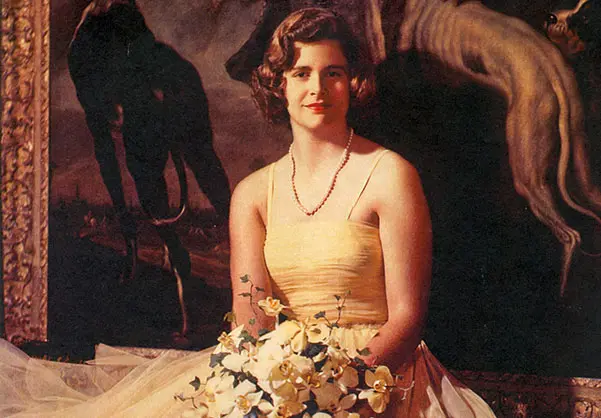
1950
Barbara Wilson celebrates her debut.
Barbara (1931-2020) came to Meadow Brook as an infant in 1931. She grew up as a loving part of the Dodge and Wilson family, alongside adopted brother Richard and Dodge siblings Frances and Daniel.
Barbara experienced many life milestones at Meadow Brook, including her debutante ball in 1950, her wedding to Thomas Eccles in 1953, and even returned home to celebrate her 80th birthday with her children, grandchildren and brother Richard. Although Barbara is often remembered as a sweet debutant, her life tells an inspiring story of independence and resilience.
Barbara’s marriage did not last and she settled in Scottsdale, Arizona as a single mother of five. Since her father Alfred had passed and her former husband was no longer in the picture, Barbara struggled to open her own bank account, even though 30years prior, her mother Matilda was named the Most Influential Woman in U.S. Banking.
She opened and operated a prominent country western nightclub called “The Lumber Mill,” in honor of her father, Alfred Wilson, who had been a prominent lumber broker. The Lumber Mill saw a variety of talented musicians and was the spot where Barbara met and helped a young John Denver launch his career.
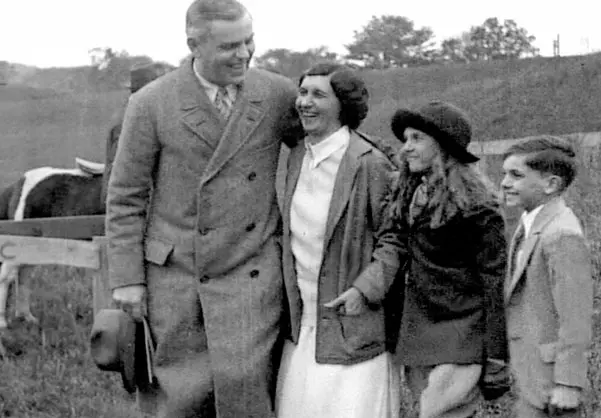
1952
Matilda and Alfred move to Sunset Terrace.
At the top of a rolling hill, overlooking the beautiful mansion and estate, stands Sunset Terrace, the 12,000 square foot retirement home built for Matilda and Alfred Wilson. They moved here after the children were grown and Meadow Brook Hall felt too large for an elderly couple to live in.
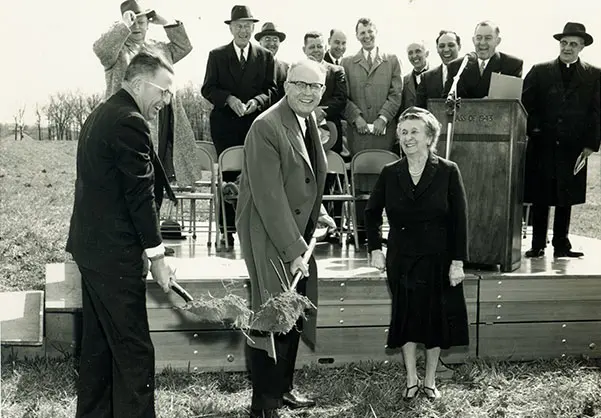
1957
Matilda and Alfred Wilson found Oakland University.
In the library at Meadow Brook, Matilda and Alfred signed over Meadow Brook Hall, 1,400 acres of land and $2 million to then Michigan State University president John Hannah to start a new university in Oakland County.
The university was originally called Michigan State University-Oakland and changed to Oakland University with the first graduating class in 1963. The university grew rapidly and in 1970 it became its own independent institution. Matilda loved the university and loved the students and activities it afforded. Her time hosting students and university events at Meadow Brook were some of the happiest years of her life.
“Education has always been an important issue for me. What I did not suspect was the depth of affection I would come to have for the students of this new university.” — Matilda Dodge Wilson
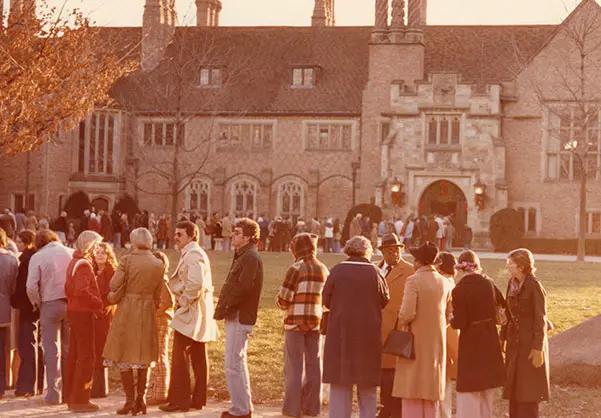
1971
Meadow Brook opens to the public.
Charged with the task of finding an appropriate use for the historic estate, Dr. Lowell Eklund and Margaret Twyman began work in 1968 to develop a viable business plan to maintain, operate and preserve the property. They were successful, and on September 25, 1971, Meadow Brook Hall officially opened as a historic house museum.
In the first year, visitation was over 50,000 — twice as many visitors as staff anticipated — and nearly 500 events were hosted. Meadow Brook operated in the black on a mere budget of $150,000. Letters to some 1,200 organizations were sent to round up help and the response yielded 254 adult and student volunteers.
In the years to follow, activity at Meadow Brook expanded substantially. Visitation climbed each year, conference activity grew and fundraising events such as Holiday Walk, Stately Dinners, Concours d’Elegance and the Gehringer-Kaline Golf Classic became annual traditions.

1971
Meadow Brook hosts its first private wedding.
While Frances, Dan and Barbara were all married at Meadow Brook, the estate didn’t serve as a wedding venue until 1971.
Today, Meadow Brook is Michigan’s most beautiful full-service wedding venue and hosts weddings and special private events throughout the year.
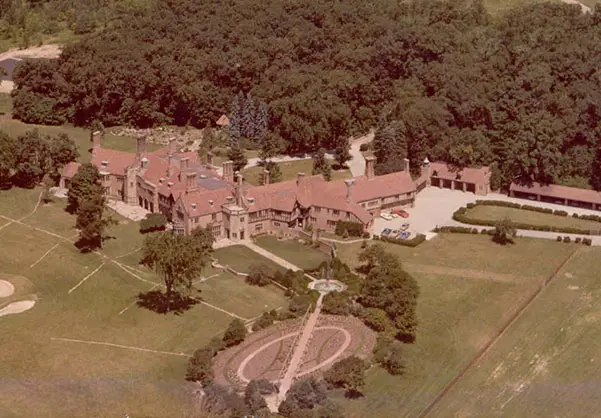
2012
Meadow Brook Hall is designated a National Historic Landmark.
National Historic Landmarks are historic properties that illustrate the heritage of the United States and represent an outstanding aspect of American history and culture.
As one of the finest examples of Tudor-revival architecture in the nation, Meadow Brook Hall was named a National Historic Landmark in 2012.
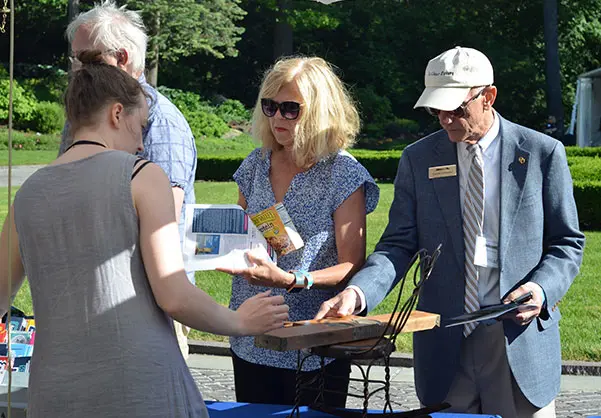
2018
Meadow Brook Hall hosts Antiques Roadshow.
Three thousand eager antique owners poured onto the grounds of Meadow Brook Hall for the filming of PBS’ most-watched series, Antiques Roadshow, in June 2018.
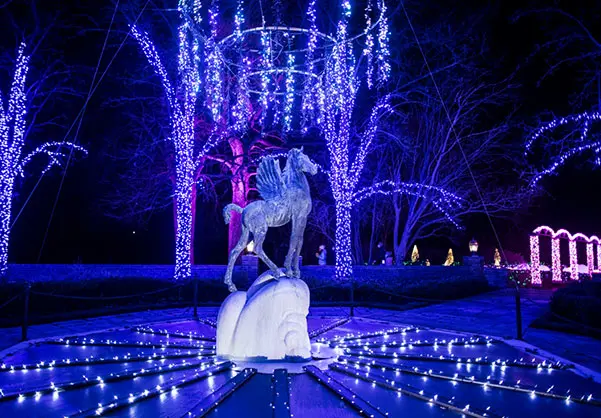
2020
Winter Wonder Lights is created.
Expanding on the beloved indoor daytime Holiday Walk show, Meadow Brook launched a dazzling immersive light experience with Winter Wonder Lights.
Unfortunately, the advent of the COVID-19 pandemic forced Meadow Brook to delay opening the show to the public to the 2021 holiday season.
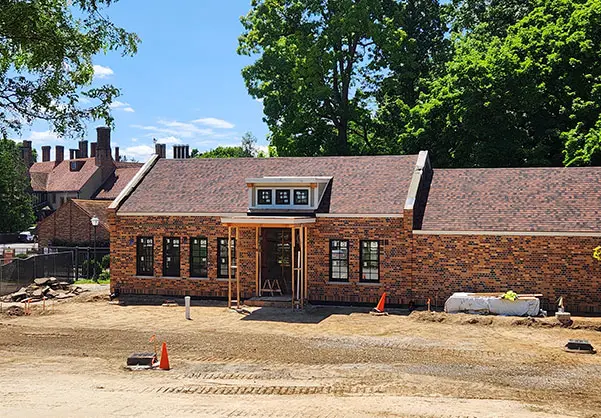
2024
The De Carlo Visitor Center is constructed.
Following many years of planning and an outpouring of generous support from the community, Meadow Brook Hall constructed a new Visitor Center. This project dramatically enhanced the visitor experience for every person who walks through our gates.
The De Carlo Visitor Center opened up new avenues to share our story with special gallery space, educational programs and event opportunities for the community.

